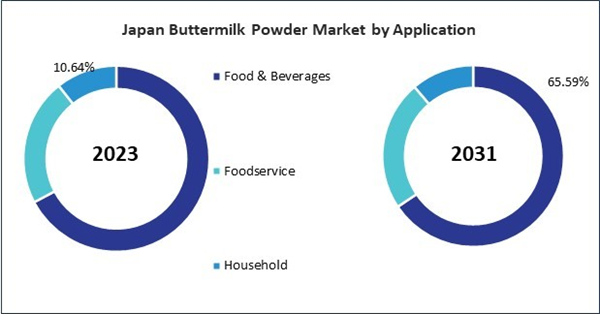In hypermarkets and supermarkets, this powder is a popular choice for consumers seeking convenient, shelf-stable dairy ingredients for home use. It is typically found in the baking or dairy section, offering easy access for shoppers who want to enhance their culinary creations. Market trends indicate a steady growth in sales of this powder in these retail formats, driven by increasing consumer interest in home baking and cooking. The rise in health-conscious eating and demand for natural ingredients are also contributing factors. Thus, the hypermarkets and supermarkets in China market registered a volume of 1,069.96 Tonnes in 2023.
The China market dominated the Asia Pacific Buttermilk Powder Market by Country in 2023, and would continue to be a dominant market till 2031; thereby, achieving a market value of $326.1 Million by 2031. The Japan market is registering a CAGR of 5.7% during (2024 - 2031). Additionally, The India market would showcase a CAGR of 7.2% during (2024 - 2031).
The texture and flavour of gluten-free products are enhanced by using this powder in gluten-free cooking. It helps mimic the qualities of gluten in baked goods, such as moisture retention and crumb structure, making it an important ingredient in gluten-free recipes. Protein and flavour are provided by this powder, incorporated into low-calorie and dietary food products with minimal fat content. This powder acts as a thickening agent in soups and gravies. Its soluble nature allows it to blend smoothly, contributing to the creaminess and depth of flavour in these culinary applications.
The adoption of this powder has been influenced by several factors, including its convenience, shelf stability, and versatility. This powder is increasingly being adopted in the production of functional foods. These foods are enhanced with additional nutrients or bioactive compounds to provide health benefits beyond basic nutrition. Its integration into these products supports the growing consumer demand for health-boosting foods. The adoption of this powder is rising within the organic and natural food segments. As consumers seek natural and organic alternatives, this powder’s natural origins and minimal processing align well with the preferences for clean and wholesome ingredients.
High milk consumption in India stimulates innovation in dairy product applications, including this powder. Indian food manufacturers are exploring new uses for this powder in products such as health drinks, meal replacements, and functional foods, driving further demand. The high consumption of milk products supports the growth of the local dairy industry in India. Increased milk production and processing activities lead to a higher powder supply, benefiting dairy farmers and processors while contributing to market growth. The substantial production of dairy products in China results in a higher supply of dairy by-products, including buttermilk. This surplus contributes to a robust powder supply, meeting domestic and international market demands.
The output of China's largest dairy companies increased by 2.9 percent year over year in May 2022. In April, these enterprises, each of which generated an annual operating revenue of $2.99 million, manufactured approximately 2.76 million metric tons of dairy products. The anticipated dairy product production for the nation is roughly 54 million tons in 2031. China’s investment in advanced dairy processing technologies enhances buttermilk powder's production efficiency and quality. Hence, the high consumption of dairy products and the increasing dairy sector in the region drive the market's growth.
Based on Distribution Channel, the market is segmented into B2B and B2C (Hypermarkets & Supermarkets, Convenience stores, Online, and Others). Based on Nature, the market is segmented into Conventional and Organic. Based on Application, the market is segmented into Food & Beverages (Bakery & Confectionery, Dairy Products, Beverages, and Others), Foodservice, and Household. Based on countries, the market is segmented into China, Japan, India, South Korea, Australia & New Zealand, Malaysia, and Rest of Asia Pacific.
List of Key Companies Profiled
- Fonterra Co-operative Group Limited
- Dairy Farmers of America, Inc.
- Arla Foods amba
- Agropur Dairy Cooperative
- Kerry Group plc.
- NOW Foods, Inc.
- Uelzena Group
- Valio Ltd.
- North Cork Creameries Ltd.
- Numidia B.V.
Market Report Segmentation
By Distribution Channel (Volume, Tonnes, USD Billion, 2020-2031)
- B2B
- B2C
- Hypermarkets & Supermarkets
- Convenience stores
- Online
- Others
By Nature (Volume, Tonnes, USD Billion, 2020-2031)
- Conventional
- Organic
By Application (Volume, Tonnes, USD Billion, 2020-2031)
- Food & Beverages
- Bakery & Confectionery
- Dairy Products
- Beverages
- Others
- Foodservice
- Household
By Country (Volume, Tonnes, USD Billion, 2020-2031)
- China
- Japan
- India
- South Korea
- Australia & New Zealand
- Malaysia
- Rest of Asia Pacific
Table of Contents
Companies Mentioned
- Fonterra Co-operative Group Limited
- Dairy Farmers of America, Inc.
- Arla Foods amba
- Agropur Dairy Cooperative
- Kerry Group plc.
- NOW Foods, Inc.
- Uelzena Group
- Valio Ltd.
- North Cork Creameries Ltd.
- Numidia B.V.









